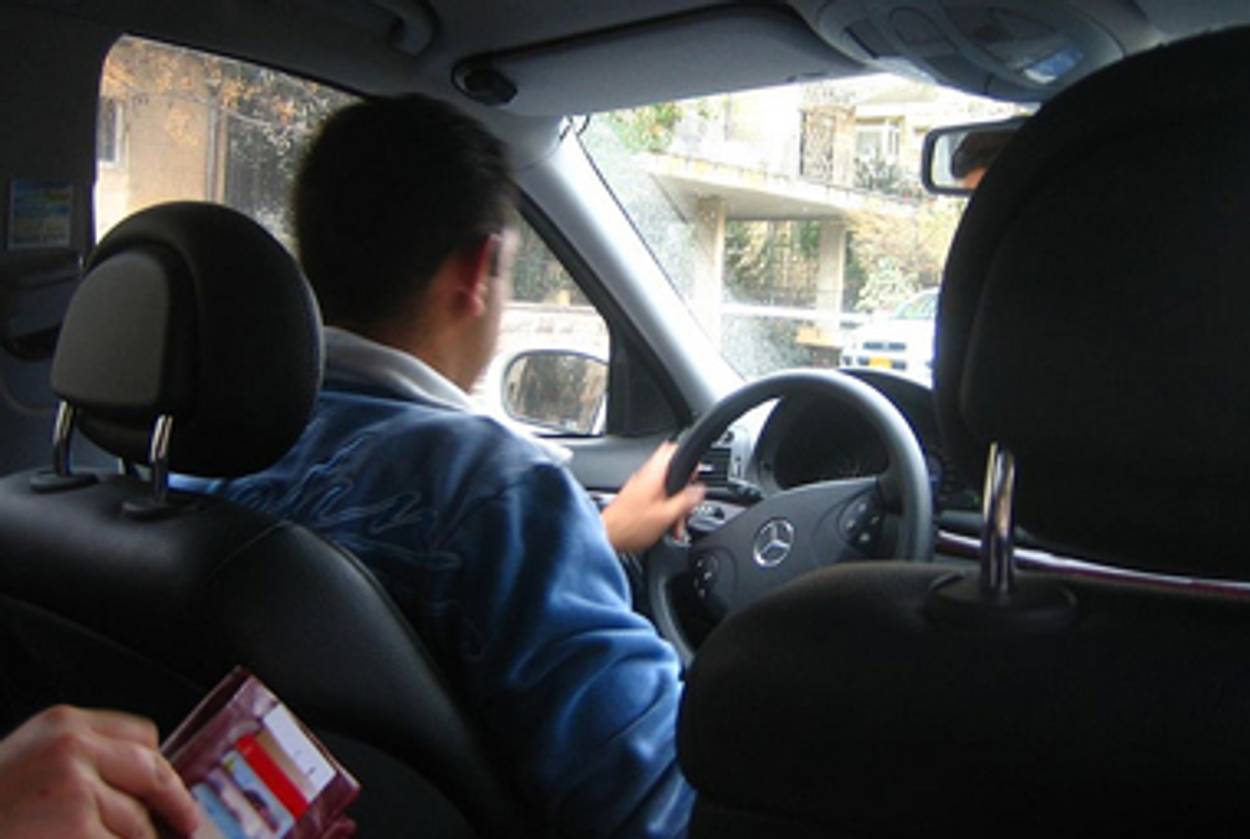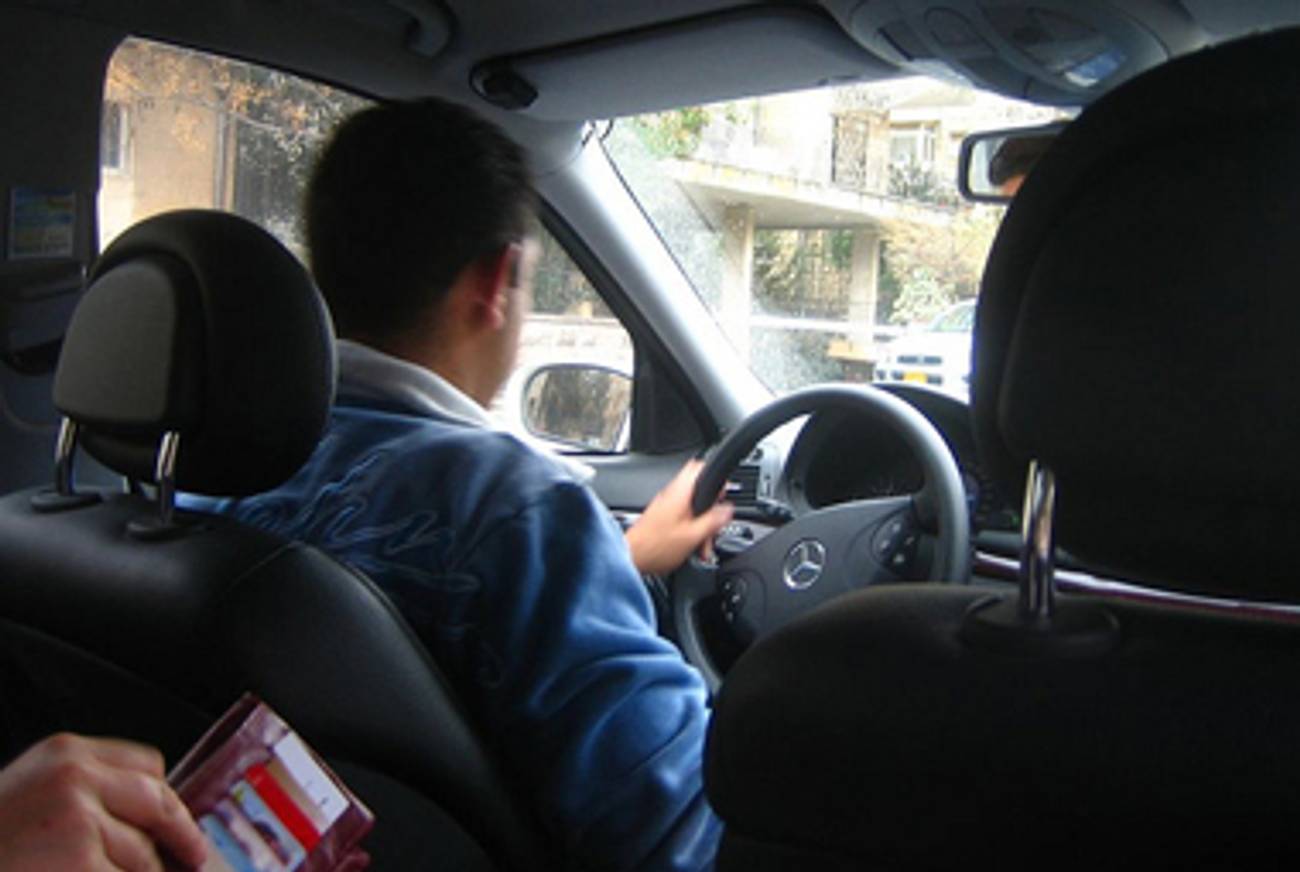Fare and Good
There are many ways a marriage can be tested. Inviting a strange cab driver into your home without informing your wife beforehand is one.




My wife says that I’m too nice, while I claim that she’s just a very, very bad person. Around the time we started living together, we had a serious fight about it. It started when I came upstairs with a cab driver who’d taken me home from the university. He had to pee. She awoke to the sound of his flushing the toilet, and she walked into our living room not fully dressed. The skinny cab driver came out of the bathroom and gave her a polite “good morning” while zipping up. She responded with a quick “Oh my God” and ran back into the bedroom.
The argument started after Skinny left. She said it was crazy to bring a cabbie you barely know into the house to use the bathroom. I said it was mean not to. After all, the entire field of taxi transportation is based on consideration of the passengers’ feelings. Those cabbies drive around the streets all day without toilets on board, so where did she expect them to relieve themselves, in the trunk? As long we focused on her claim that I was crazy, the discussion was quite civilized. But the minute I brought up the opposing hypothesis—that maybe most of humanity invites cab drivers to use their bathroom, and only the bad people among us, like her, for example, think it’s weird—the decibel level began to rise.
It ended with our making a list of six mutual friends who we would ask the same question: Did you ever invite a cab driver to come up to your apartment to use your bathroom? If the majority said yes, I could keep on inviting cabbies into our home. If the majority said no, I’d stop. And in case of a tie, I could keep on inviting them up, but I’d have to apologize to my wife for saying she’s a bad person and give her a foot massage every day for a week.
We asked our six friends. They were all on her side. But what do you do if you’re in a cab with a driver who really, really needs to go to the bathroom, I asked each of them. You just look the other way? You pay him and say, “Keep the change, man, and keep driving till you find yourself sitting in the middle of a little puddle”? It was only then that I realized that I was endowed with the unique and absolutely insignificant power to sense when people need to go to the bathroom. It turned out that to me, things like that were as transparent as those glass doors of the bank my wife keeps crashing into, while the rest of the human race is totally insensitive to the status of other people’s bladders.
This happened 11 years ago, but last Friday, driving to Amnon’s wedding at Kibbutz Shefayim, I remembered it. Amnon and I work out at the same gym. The only reason I know that his name is Amnon is because the first time I met him, the gym owner said to him, “Hey, Amnon, how about trying a little deodorant?” And after a second’s pause, he added, “Tell me, Etgar, that smell, isn’t it criminal?” I told the gym owner that I didn’t smell anything, and ever since, Amnon and I have been sort of friends. The truth is that when he gave me an invitation the last time I bumped into him, I was a little surprised. But it’s like a subpoena—the minute the envelope touches your hand, you know you have to show up. That’s the thing about wedding invitations—the less you know the person inviting you, the more obligated you feel to go. If you don’t show up at your brother’s wedding and say, “I couldn’t come because the kid had chest pains and I took him to the E.R.,” he’ll believe you because he knows there’s nothing you want more than to be there with him on his big day, but if it’s an Amnon you hardly know, he’ll realize right away that it’s an excuse.
“I’m not going to the wedding of some smelly guy from your gym,” my wife said, her tone determined.
“OK,” I said, “I’ll go alone. But next time we argue and I tell you that—”
“Don’t say I’m a bad person again,” she warned me. “I hate it when you do that.”
So, I don’t say it, but I think it, all the way to the wedding at Kibbutz Shefayim. I won’t be able to stay for very long. The invitation said the chuppah would be at 12 and at 1 p.m. there’s going to be a screening of my former student’s film at the Cinematheque in Tel Aviv.
With the usually light Friday noon traffic, Shefayim-Tel Aviv takes half an hour, tops, so I’m sure I’ll be covered. Except that it’s already 12:30 and the chuppah is showing no signs of starting. The student who directed the film has called three times to ask when I’d be there. More accurately, he called twice and his older brother, who I don’t even know, called the third time to thank me for agreeing to come. “He didn’t invite any of his other teachers to this screening,” he told me, “just family, friends, and you.” I decide to cut out. After all, Amnon saw me here, and I’ve already given a check.
As I get into the cab, I text Gilad that I might be a few minutes late. He texts me back that it’s OK. They have some technical problems, and the screening will be delayed at least an hour. I ask the cab driver to make a U-turn and go back to the wedding hall. The chuppah has just ended. I go over to Amnon and his bride and congratulate them. He hugs me, looking really happy. It wasn’t nice for my wife to say he’s “smelly”; he’s a great person with feelings and all that, but the truth is that he does have strong body odor.
During the screening, I get a text message from my wife. “Where are you? The Druckers are waiting. Shabbat starts soon and they have to make it back to Jerusalem.” The Druckers are friends who have become religious. Years ago, we used to smoke together. Today we mostly talk about kids. They have so many. And all of them, thank God, are healthy and sweet. I sidle toward the exit. Gilad saw me come in. That’s enough. In an hour, I’ll text him that it was great, that I had to take off after the screening. Sitting near the exit door is Gilad’s brother. He looks at me as I leave. His eyes are wet with tears. He isn’t crying because of me; he’s crying because of the film. With all that pressure, I didn’t notice that they were screening one. If he’s crying, it must be really good.
On the cab ride home, the driver talks constantly about the riots in Syria. He admits that he doesn’t know who’s against whom there, but he’s excited about all the action. He talks and talks and talks, and the only thing I’m really listening to is his body. The guy’s dying to pee. When we get to my house, the meter shows 28 shekels. I give him 30 and tell him to keep the change. From the street, I can see my wife on the balcony laughing with Dror and Rakefet Drucker. She’s not a bad person.
Translated by Sondra Silverston.
Etgar Keret is a Tel Aviv-based filmmaker and fiction writer. He writes a regular column from Israel for Tablet.
Etgar Keret is a Tel Aviv-based filmmaker and fiction writer.